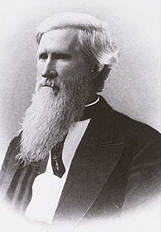Henry Massey Rector
Henry Massey Rector (born May 1, 1816 in Louisville , Kentucky , † August 12, 1899 in Little Rock , Arkansas ) was an American lawyer and politician and between 1860 and 1862 governor of the state of Arkansas.
Early years and political advancement
Henry Rector was tutored by his mother before he attended elementary school in Louisville for a year. He later studied law in Arkansas and was admitted to the bar in 1854. He had already moved to Arkansas in 1835. After a brief stint at the State Bank in Little Rock, he became the US Marshal in charge of Arkansas . Between 1848 and 1850 he was a member of the Arkansas Senate ; after that he was head of the land surveying office for four years. Between 1855 and 1859 he was a member of the Democrats in the Arkansas House of Representatives and then judge of the Arkansas Supreme Court. In the gubernatorial elections of 1860, Rector was elected as the new governor of Arkansas.
Arkansas Governor
Rector took up his new office on November 16, 1860. His two-year term of office was marked by the events of the civil war . Almost at the same time as Rector, Abraham Lincoln was elected the new US President . However, his name was not listed on the Arkansas ballot papers. Lincoln's views on slavery met with widespread opposition in Arkansas. The issue hadn't been a campaign issue in Arkansas either because the candidates were unanimous on that point. In previous years, the topic was not as hotly debated in Arkansas as in most of the other southern states. It was only when South Carolina reacted to Lincoln's election by leaving the Union that a radical group also formed in Arkansas, which Rector was rather reserved about. His only contribution to the proceedings surrounding the Arkansas secession was the extraordinary election and the calling of a general assembly to deliberate on the matter. The body decided in March 1861 to leave the decision on a possible secession to a referendum in August. However, further development overtook this plan. Since April 13th, the day the Confederate attacked Fort Sumter in Charleston , South Carolina, the American nation had been in a Civil War and Arkansas had to make a decision. The governor harshly declined a request from Lincoln for Union support. The General Assembly was convened again on May 6, 1861, and it resolved to withdraw the state from the Union and to join the Confederate States on May 20 . At the same time, a new constitution was passed that shortened the governor's term of office to two years. Rector's task of initiating the mobilization was made difficult by political squabbles of his opponents.
Further life
After his tenure ended, Rector joined the Arkansas National Guard as a soldier and remained there during the war. At the end of the war, his property was destroyed by the effects of the war. He worked first as a cotton planter and then again as a lawyer. In 1874 he was a delegate at a new meeting to amend the state constitution. But there he no longer had much influence. Henry Rector was the cousin of former Governors James Sevier Conway and Elias Nelson Conway . He was married twice and had a total of eight children.
Web links
- Henry Rector in the National Governors Association (English)
- Online biography of Governors of Arkansas (English)
- Biography in the Arkansas Encyclopedia (English)
- Henry Massey Rector in the database of Find a Grave (English)
| personal data | |
|---|---|
| SURNAME | Rector, Henry Massey |
| BRIEF DESCRIPTION | American lawyer and politician |
| DATE OF BIRTH | May 1, 1816 |
| PLACE OF BIRTH | Louisville , Kentucky |
| DATE OF DEATH | August 12, 1899 |
| Place of death | Little Rock , Arkansas |

